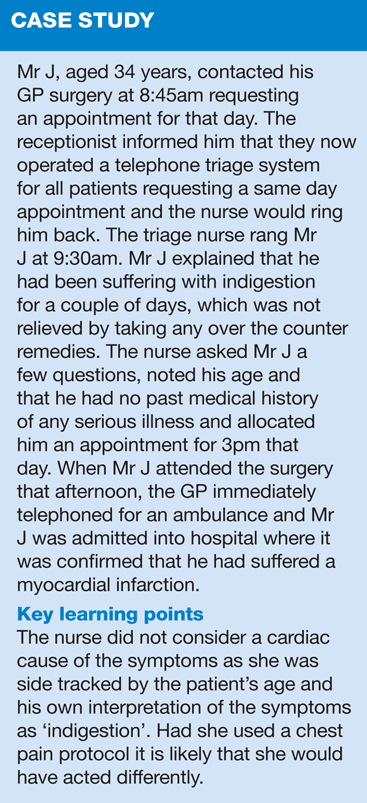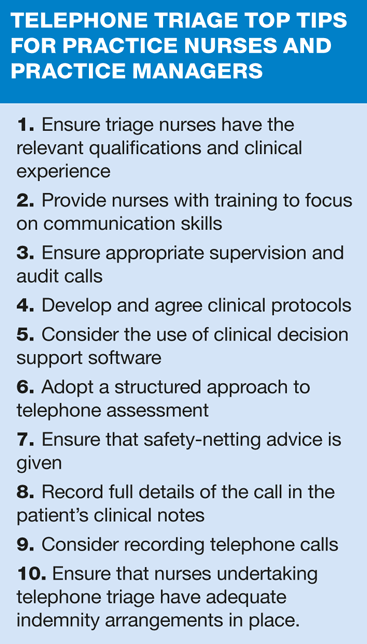Medicolegal issues: Minimising the risks in telephone triage
Diane Baylis, RN
Diane Baylis, RN
Clinical Risk Manager,Medical Protection Society
The growing pressure on general practice for appointments has led to practices introducing nurse telephone triage. Diane Baylis, a registered nurse and Clinical Risk Manager at the Medical Protection Society (MPS), looks at the steps you should take to minimise the risks.
We live in the 'Information Age' where we have the ability to access information at the click of a button. In our fast-paced society there is an ever-increasing demand for access to resources and the demand for instant healthcare is escalating. The rising demand for appointments has led to some practices introducing a system for nurses to assess a patient's symptoms or health concerns by telephone and offer advice or referral.
TELEPHONE TRIAGE
In the 1980s, isolated triage programmes were introduced around the country, largely for patients who wanted access to healthcare out-of-hours. Now, the majority of primary care contact is by telephone and this is likely to grow further.
Telephone triage has, in many ways, revolutionised medicine and provides many benefits for both patients and practices, including quicker access to advice and an increase in availability of face-to-face appointments. However, alongside the benefits of telephone triage - and due to the changes in roles and responsibilities of nurses - there are also risks, and these must be considered carefully.
TRAINING AND EXPERIENCE
Telephone consultation is regarded as a clinical sub-specialty, which requires specific skills and knowledge. Telephone triage should not be introduced without adequate training and supervision for all triage staff. Nurses are trained to use their observational skills when assessing a patient. Most of these sources of information are absent when assessing a patient over the telephone and, without visibly seeing the patient, vital pieces of information can be missed. The nurse must therefore rely more heavily on his or her own communication skills and clinical experience.
Decision-making in telephone triage can be complex; the nurse is relying on the patient's understanding of their own condition and their ability to communicate the relevant information. The most common risk associated with telephone triage is miscommunication. In many cases triage is through a third party, such as a family member, which increases the risk as they may not be able to describe symptoms accurately or may miss vital symptoms altogether. Due to the fast-paced nature of telephone triage, nurses may feel under pressure to make decisions quickly, with potentially serious consequences.
It is vital that all nurses receive appropriate training on communication and listening skills prior to commencing this role. It is also important that nurses adhere to the Nursing and Midwifery Council (NMC) code of conduct, and practise within their own limitations and competence.1
SUPERVISION AND AUDIT
It is good practice for nurses to receive clinical supervision and to be able to reflect on their assessments, focusing on what went well and what could be improved. Without proper auditing, the nurse could be practising unsafely or arranging appointments inappropriately. The RCGP has developed a clinical audit toolkit for use in out-of-hours care, which can be adapted for use in general practice triage.2
Some practices record all telephone consultations, which can be useful in the event of a potential complaint or issue. However, patients must be informed that the calls are being recorded before proceeding. All recordings constitute part of the medical record and therefore the same rules of confidentiality and storage apply as for a patient's written and electronic clinical notes.
PROTOCOLS
The use of evidence-based clinical protocols and agreed standards ensures that nurses have a consistent approach to the management of common acute illnesses. This helps to standardise the process of data collection, planning, intervention and evaluation. The practice should produce a protocol that includes identifying who is not suitable for telephone triage and 'high risk' callers. Some practices now use clinical decision support software, which is predominantly used by out-of-hours service providers, and has been found to improve the safety and efficiency of the consultation.3
STRUCTURED APPROACH
When undertaking telephone assessments it is important to adopt a structured approach. Conducting a structured exploration of the current symptoms, medical history and usual health status, will enable nurses to provide advice on immediate treatment, referral or other action needed. Clarify and confirm the patients' understanding, agreement and responsibilities for any action that is taken.
SAFETY NETTING
When a plan of care has been agreed, the nurse should explain the healthcare advice required, the natural history of the condition, any worsening signs to look out for and encourage the patient to call back if they have any further concerns. Confirm that the agreed action is understood by the patient or caller.
RECORD KEEPING
Detailed documentation of the telephone assessment is vital. It is important that the medical records include enough detail to justify the proposed management and to demonstrate that appropriate management of the patient's problem can take place without the need for a face-to-face consultation, where necessary.
INDEMNITY
MPS has seen an increase in its nurse members since the decision taken by the Royal College of Nursing (RCN) to no longer provide indemnity to practice nurses.4 Although assistance is always at the discretion of MPS council, it is unlikely that GPs would be granted assistance for claims against nurses working in extended roles, such as telephone triage, and for this reason they are encouraged to seek indemnity in their own right.5
SUMMARY
The role of the nurse in general practice continues to change and diversify. When introduced, after consideration of the above issues and options, and with robust systems and protocols in place, telephone triage can be a safe, effective and valuable resource for a GP surgery.
REFERENCES
1. Nursing and Midwifery Council (2008) The code: Standards of conduct, performance and ethics for nurses and midwives http://www.nmc-uk.org/code 2. The RCGP Urgent and Emergency Care Clinical Audit Toolkit
http://www.rcgp.org.uk/clinical_and_research/circ/evidence__effectiveness/audit/out_of_hours_audit.aspx 3. Males T (2007). Telephone consultations in Primary Care: a practical guide. Royal College of General Practitioners (ISBN 978-0-85084-306-4)
http://www.rcgp.org.uk/bookshop/info_2_9780850843064.html 4. Changes to the RCN indemnity scheme
http://www.rcn.org.uk/support/legal/changes_to_indemnity_scheme_january_2012 5. Medical Protection Society (2011) Nursing jeopardy in Your Practice Vol 5 No 4 2011
http://www.medicalprotection.org/uk/your-practice-october-2011/nursing-jeopardy
Related articles
View all Articles


